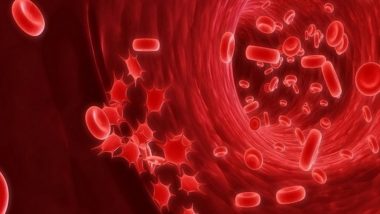Washington, December 26: A new study has revealed that with the help of an enzyme that limits blood vessel growth, it may be possible to develop new or better treatments for multiple health conditions. The study published in the journal PLOS Biology pinpoints the precise molecular machinery that makes this happen, providing scientific insights that can potentially be translated into medicines that help kill tumors and stop cancer from spreading in the body.
The findings also may enable new interventions that promote healthy blood-vessel development for people with heart disease and other conditions, says the study's leader Xiang-Lei Yang, Ph.D., a professor In the Department of Molecular Medicine at Scripps Research. Broccoli, Brussels and Sprouts Delight Can Prevent Advanced Blood Vessel Disease, Shows Study.
"We've uncovered a key regulatory step that drives blood-vessel development for tissues deprived of adequate oxygen--finally creating a more complete picture of the complex process that enables cancer tumors to adapt and survive," says Yang. "By blocking this process on a molecular level, we found it's possible to inhibit tumor growth."
This study culminates a years-long project initiated by first author Yi Shi, Ph.D., who began the work as a staff scientist in Yang's lab but recently finished his contributions from Nankai University in Tianjin, China, where he is now a faculty member.
Over the past decade, Yang and her team have published several key discoveries relating to how cells create blood vessels, delving into previously unknown roles of genes that regulate this function. Prior studies dealt with genes known as c-Myc and HIF-1, which promote blood vessel development and have strong links to cancer.
In the new study, Yang's team looked at negative regulators of blood vessel growth--or proteins that turn the function off--to find out what causes them to become inactivated when tissues are deprived of oxygen, which is what happens within a solid tumor.
Their central focus was an enzyme known as SerRS (seryl-tRNA synthetase), most commonly known to exist in the gel-like substance within cells. There, the enzyme kicks off the first step of making new proteins. However, the enzyme is also found within the nucleus, performing an entirely different but vital job: Limiting unhealthy blood vessel growth by tamping down the function of c-Myc and HIF-1.
In the study, the researchers found that SerRS can be "silenced" by proteins known as ATM/ATR, which manage DNA damage responses. These proteins activate when tissues are deprived of oxygen. When this happens, new blood vessel growth can go unchecked and tumors can flourish.
Through separate experiments involving mice and human breast cancer cells, the team confirmed that by blocking the effect of ATM/ATR on SerRS, they were able to successfully reduce tumor growth. Notably, Yang says, SerRS is part of an evolutionarily ancient family of enzymes called tRNA synthetases, which begin the process of making proteins that go on to form blood, skin, bones, and other essential elements of human life. The findings of this study show that SerRS has evolved extra functions beyond making proteins.
"It's possible that SerRS regulates more than blood vessel development," Yang says. "This is a compelling finding that opens the door to further investigation into how broad its influence may reach in the human body."













 Quickly
Quickly


